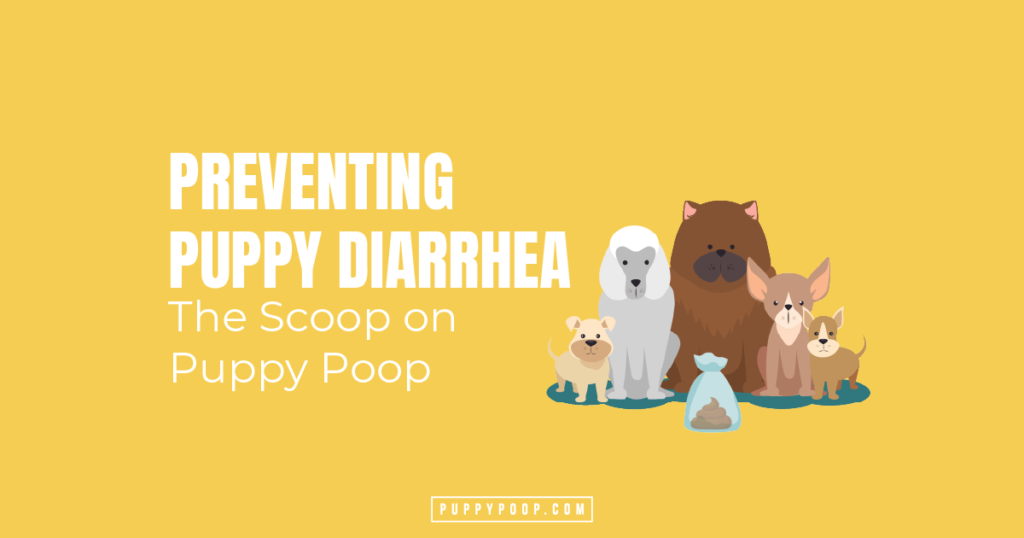When you first get your puppy they can be so cute and exciting it can be easy to forget you now have a new responsibility. Puppies can be so much fun, but they also require some work, especially in their first year. Don’t worry though, we’ve got you covered with the basics you’ll need to start your puppy off right!
Your puppy’s first visit with a veterinarian
Once you bring your puppy home, you should try to get them in to see a veterinarian as soon as possible. Ideally, they should see a veterinarian in the first week of you bringing them home. Your veterinarian will:
- Make sure your puppy is healthy
- Review your puppy’s vaccination history and plan their vaccination schedule for the following months. Once your puppy has received their puppy vaccines, discuss titer testing with your veterinarian to avoid over-vaccinating your dog as they get older.
- Provide them with dewormers and other preventatives
A fecal test is an important part of your puppy’s first visit to the veterinarian. Fecal tests are used to assess your puppy’s stool for intestinal parasites. Parasites are extremely common in puppies so more frequent fecal tests during their first year is recommended.
Parasites that commonly affect puppies
There are many intestinal parasites that can affect your puppy. Because they are young and their immune systems aren’t fully developed, they’re unable to control the infection and can experience worse symptoms than an adult dog.
Common parasites that can affect puppies include coccidia, giardia, roundworms, whipworms, tapeworms and hookworms. Puppies can be exposed to parasites through infected feces, soil, and water sources. Some parasites can be transmitted directly from your puppies’ mother. For instance, roundworms can be transmitted through the placenta or nursing!
Signs your puppy may have a parasite infection include:
- Runny puppy poop or diarrhea. Their stool may also have bright blood and/or mucus.
- Distended belly
- Thin body condition
- Lethargy
- Sometimes you can see worms in their stool which often resemble grains of white rice.
What should my puppy’s poop look like?
When looking at your puppy’s poop, it’s important to assess the 4 C’s: consistency, coating, contents and color. Normal puppy poop varies and can change over time depending on your puppy’s diet. To pick up on early signs your puppy is having dog digestive issues, it’s important to know what is normal. Keeping a log of their poop photos and any notes can be really helpful. Taking pictures of any digestive issues can also help your veterinarian understand what’s been going on. Download the DIG Labs Digestive Health Check app to do all this seamlessly from your phone!
It’s also important to remember that parasite infections don’t always cause obvious changes in your puppy or their poop. A fecal test is needed so your veterinarian can examine their stool sample using a microscope and other lab processes to find eggs or cysts. This is why regular fecal testing is so important, even as your puppy becomes an adult. When your puppy reaches 1 year, we usually recommend bi-annual fecal tests at a minimum.
Feeding your puppy
It’s important to give your puppy a routine, especially when it comes to their diet. Try to avoid leaving food out at all times. Leaving food out all day or free feeding may lead to them developing bad eating habits where they may overeat, not eat at all or eat at different times of the day. When they eat can also affect their potty training, so getting them on a strict eating schedule will help you prevent unwanted accidents in the house.
Feed a diet that is made specifically for puppies or for all life stages. Make sure to follow the amounts specified for that specific diet based on your puppies age and weight.
- Most puppies do well with 3-4 meals a day until they are about 6 months old. At that time, they can be weaned to 2 meals a day.
- For toy or small breed dogs, feeding meals 4 times a day for the first 6 months may be best since they are so tiny. At 6 months, they can then go to 3 meals a day.
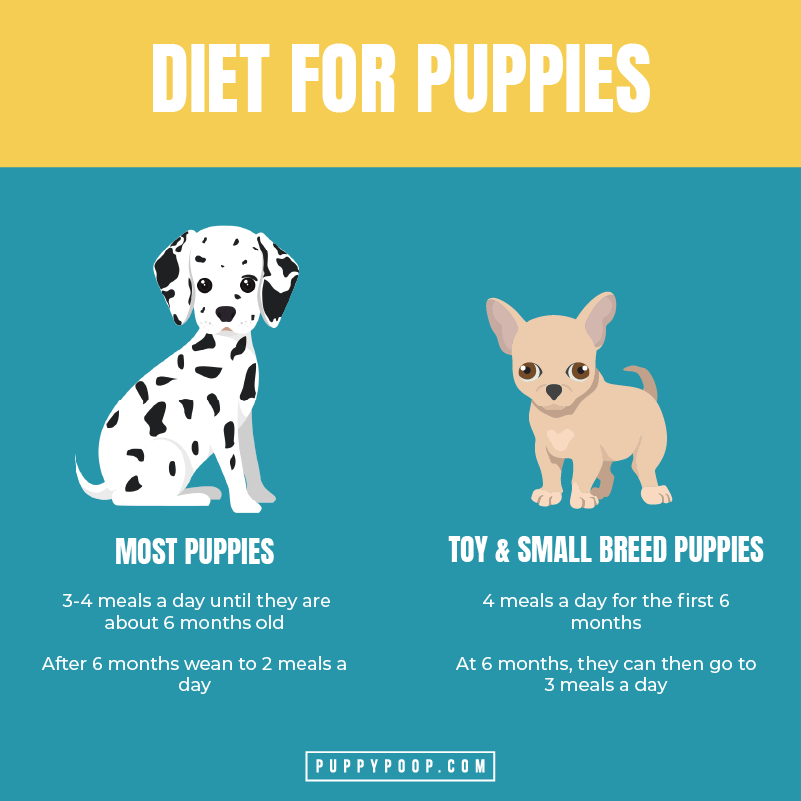
It’s best to discuss your puppy’s feeding schedule with your veterinarian to ensure you are meeting their nutritional requirements based on their age, breed, activity level and size.
What Should I feed my puppy?
There are amazing benefits to feeding fresh food to our dogs to help them live healthier, longer lives. Many dogs thrive on fresh, lightly cooked or raw diets. Some of our favorite nutritious and dog-safe foods include eggs, green leafy vegetables, blueberries, and pumpkin. Start your puppy off right with a fresh food diet. You can create a nutritionally balanced homemade diet or use one of the many fresh dog foods that are pre-packaged and can be delivered directly to you. (link to homemade diet DIG blog).
While many human foods are safe for your puppy, some foods can be very toxic to dogs and can affect puppies much more because of their smaller size.
Some common items to avoid are:
- Chocolate
- Grapes and raisins
- Macadamia nuts
- Milk and dairy products. Note: Dogs are not able to digest milk products well, which can lead to tummy troubles like diarrhea.
- Avocado
- Onions, garlic or chives
- Xylitol, which can often be found in some peanut butters, baked goods and chewing gum.
- Yeast dough
- Alcohol
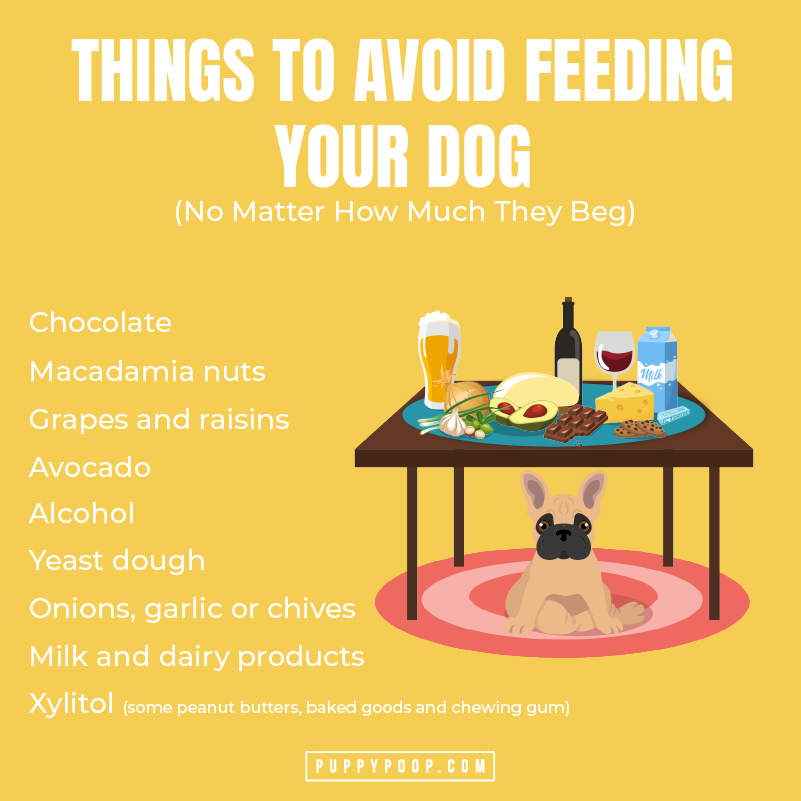
These foods can be very toxic to your puppy and depending on the dose, can lead to severe medical conditions and even death. If your puppy ingests small amounts of these foods, they may show signs of an upset stomach, like puppy diarrhea or loose stool. Whether it was a small or large amount, it’s always good to let your veterinarian know.
Can I change my puppy’s food?
You may be worried about changing your puppy’s food. Puppies can be very sensitive to the slightest diet change, leading to puppy diarrhea or vomiting. But, there are ways to reduce the chance of this happening!
A gradual food transition is key for puppies. When you first get your puppy, they will have gone through a lot of changes (new home, treats and experiences) so changing their food too quickly may add more stress.
You should aim to transition your puppy onto a new puppy food recipe over 5-7 days to avoid digestive issues or diarrhea. Do not expect to transition your dog’s food in one meal or one day. To do this, you can gradually introduce more and more of the new diet over time.
For example, when switching food over 7 days the mix could be:
- Day 1 and 2: 25% new diet + 75% old diet
- Day 3 and 4: 50% of each diet
- Day 5 and 6: 75% new diet + 25% old diet
- Day 7: 100% new diet
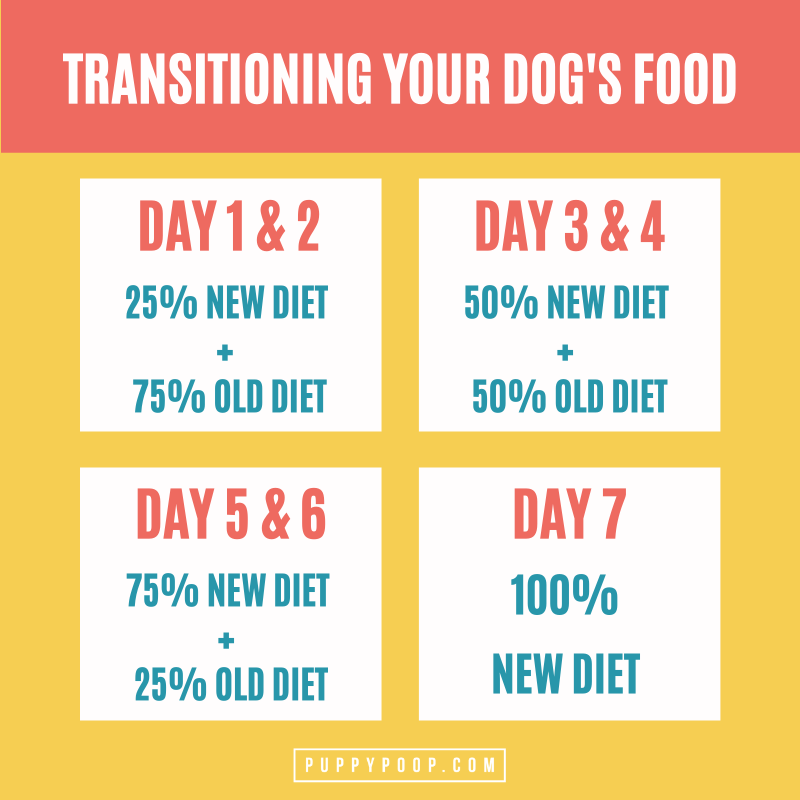
It will be important to monitor your puppy throughout the transition. If at any point they begin experiencing vomiting, runny stool, diarrhea, decreased appetite or decreased energy, slow down. If it continues despite a slow transition, this new food may not be best for your puppy or your puppy may be having an upset stomach for a separate reason. In this case, reach out to your veterinarian for help.
What do I do if my puppy has diarrhea?
Puppies can commonly get diarrhea, especially when you first bring them home. Some common reasons puppies get diarrhea include:
- Stress
- Food or treat changes
- Changes in routine
- Infections from parasites, bacteria (e.g. Clostridium, Salmonella, E. coli) or viruses (e.g. parvovirus)
- Toxins
If your puppy has diarrhea and is unwell (not eating, drinking or playful), reach out to your veterinarian right away. If your puppy is having diarrhea but is otherwise acting like themselves, call your veterinarian to see if you can drop off a fecal sample, if your puppy hasn’t had a recent fecal test. It’s also super important to keep them hydrated.
Offering plenty of water and ice-cubes for them to lick is a good start. Adding in a splash of water or no-sodium bone broth to their food can also give them a boost of hydration. However, if your puppy’s diarrhea isn’t resolved after 48 hours it’s important to reach out to your veterinarian to let them know.
To be prepared for future bouts of diarrhea, we also highly recommend creating a puppy first aid kit.
Stock up with our trusted must-have puppy products for diarrhea and everyday life:
- 100% Plain Canned pumpkin. If your puppy has had a recent negative fecal test but is showing signs of loose stool or diarrhea, adding in a source of fiber, like plain canned pumpkin can help. It should be 100% plain pumpkin and not contain any added ingredients like sugar or spices.
- DiaGel Anti-Diarrhea: DiaGel is a canine anti-diarrheal that is safe for our dogs, including puppies, due to its natural ingredients. It’s easily administered without mess by squirting the gel into the back of your dog’s mouth.
- Slippery Elm Bark Anti-Diarrheal: Slippery elm bark is one of our favorite at-home remedies for diarrhea. It is referred to as nature’s Pepto-Bismol, a safe anti-diarrheal for dogs.
- Thermometer
- Travel water dispenser to help keep them hydrated wherever you are.
- Slip Lead
How to prevent puppy diarrhea
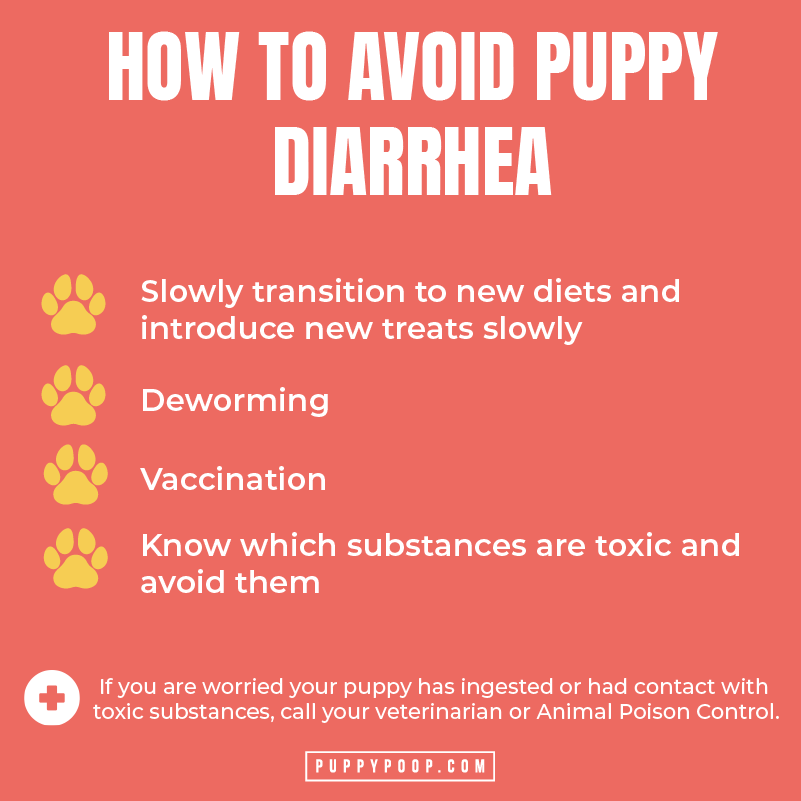
Preventing your puppy from ever having runny stool or diarrhea will be impossible but you can definitely reduce their chances.
- Slowly transition to new diets and introduce new treats slowly.
- Probiotics. We recommend broad-spectrum probiotics for all puppies to help boost their gut and immune health. Did you know that 70% of a dog’s immune system is in their gut? Not only will probiotics improve your puppies health as they are growing, but they’ll also greatly reduce the chances of puppy loose stool in the future.
- Deworming. Follow your veterinarians guidance to ensure your puppy is regularly de-wormed.
- Vaccination. Stay on track with your puppy’s initial vaccination schedule so that they are covered from any viruses (for example, parvovirus). that may cause puppy diarrhea.
- Know which substances are toxic and avoid them. If you are worried your puppy has ingested or had contact with toxic substances, call your veterinarian or Animal Poison Control.
Puppy diarrhea is really common but can be very scary the first time it happens. This is where monitoring your puppy’s poop becomes so important. Taking photos regularly will help you notice subtle changes. Always call your veterinarian if you are ever in doubt on what to do for your puppy’s digestive issues. It’s never a bad idea to be overly cautious, especially when they’re only a few months old.
Get the DIG Labs App
Download the free DIG Labs Digestive Health Tracker to get personalized insights and recommendations for your dog based on their stool.

